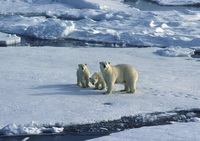Climate Change Talks Are Close to Deadlock
Before the summit in Copenhagen the world leaders tried to inject momentum into climate change talks. China laid out a plan to curb carbon emissions by 2020 and U.S. President Barack Obama called on all nations to act now to tackle global warming.

With less than three months until a United Nation conference aimed at sealing the world's toughest pact to fight climate change, U.N. Secretary-General Ban Ki-moon called Tuesday's leaders' summit to give negotiations an extra shrove.
"While the summit is not the guarantee that we will get the global agreement, we are certainly one step closer to that global goal today," Ban said at the close of the meeting.
The one-day summit drew nearly 100 heads of state and government before official talks among 190 nations in Copenhagen in December to forge a replacement to the Kyoto Protocol, whose first phase runs out at the end of 2012.
Analysts and green groups gave cautious praise to China and Japan but said Obama's speech was long on rhetoric but short on specific pledges of U.S. action, Reuters reports.
Meanwhile, President Barack Obama acknowledged during his speech at the summit that the US as well as other developed nations “have a responsibility to lead” in cutting carbon emissions, though he also emphasized that rapidly developing nations, such as China and India, must do their part, too, the Christian Science Monitor reported Tuesday.
But some are questioning whether Mr. Obama even has the ability to deliver climate change legislation in his own country before the Copenhagen summit, reports Bloomberg.
The House has passed a bill that would establish a cap-and-trade system for carbon emissions and seek to reduce emissions by 17 percent from 2005 levels by 2020. But in the Senate, most Republicans and some Democrats have said they will not support the legislation.
“People are waiting to see the signal from the White House about what comes next after health care and how important it is to him to have some momentum going into Copenhagen,” Alden Meyer, director of strategy and policy at the Union of Concerned Scientists, an advocacy group based in Cambridge, Massachusetts, said in an interview. “They are starting to get more impatient.” Christian Science Monitor reports.
It was also reported, Ban Ki-moon, the UN secretary-general, said failure to reach a new treaty this year on fighting global warming would be "morally inexcusable".
He called on presidents, prime ministers and other leaders "to accelerate the pace of negotiations and to strengthen the ambition of what is on offer" for a deal at Copenhagen in December.
"Failure to reach broad agreement in Copenhagen would be morally inexcusable, economically short-sighted and politically unwise," Ban said.
"The science demands it. The world economy needs it."
Smaller island nations again warned that their livelihoods would vanish if the world's major polluters could not reach a deal that stopped global temperatures from rising.
Mohamed Nasheed, president of the small Indian Ocean country of Maldives that fears being submerged by rising sea levels, said: "Once the rhetoric has settled and the delegates have drifted away, the sympathy fades, the indignation cools and the world carries on as before.
"A few months later, we come back and repeat the charade," Aljazeera.net reports.
Subscribe to Pravda.Ru Telegram channel, Facebook, RSS!




